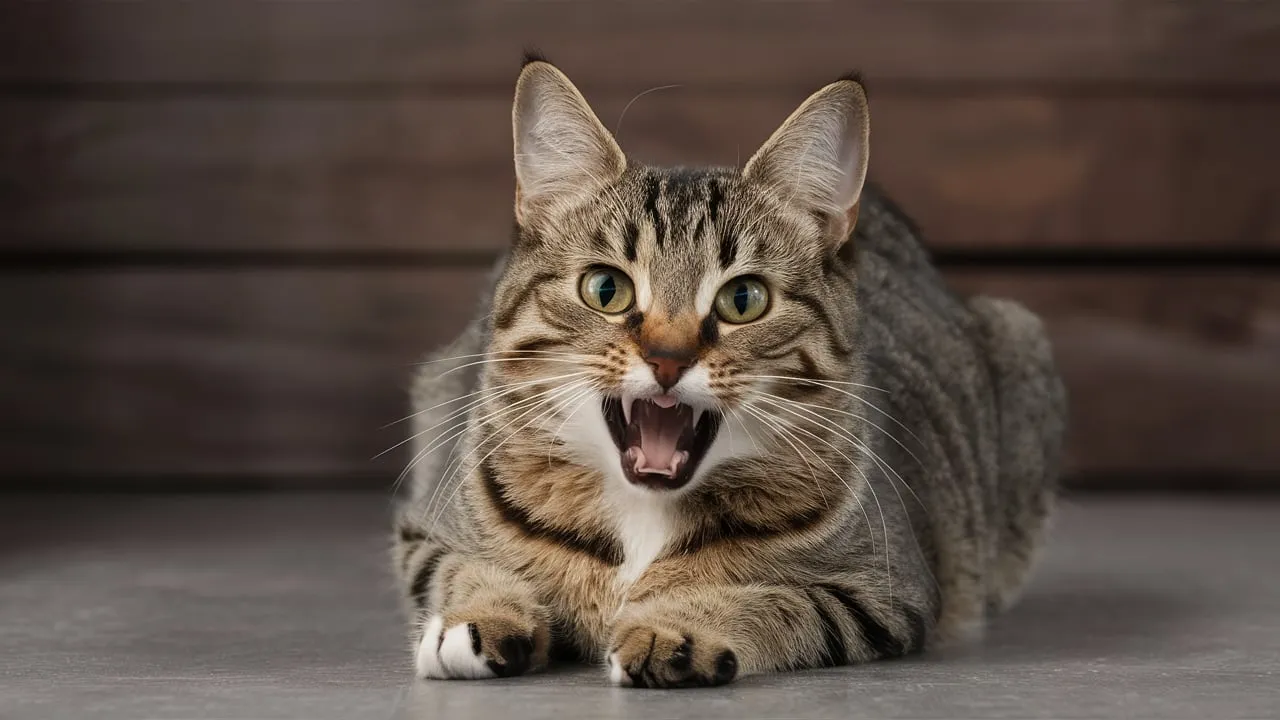Cats are known for their affectionate purrs and playful antics, but sometimes their love can come with a little nip! If you’ve ever been on the receiving end of a cat bite, you know it can be a confusing and even painful experience. But don’t worry, it’s rarely a sign of aggression. In most cases, biting is a form of communication, and understanding why your cat is biting is the first step to resolving the issue. Come explore with In For Cat.
Understanding Cat Communication
Cats communicate through a variety of means, including body language, vocalizations, and yes, even biting. While biting can be a sign of aggression, it’s often a way for cats to express:
- Fear or anxiety: If your cat feels threatened or scared, they may bite as a defense mechanism.
- Pain: If your cat is in pain, they may bite when you touch a sensitive area.
- Playfulness: Kittens and even adult cats often bite during play, especially if they’re over-excited.
- Redirection: Cats may redirect their aggression towards you if they’re feeling frustrated or stressed.
- Over-grooming: Some cats may bite during grooming sessions, especially if they’re anxious or stressed.

Why Does My Cat Bite Me?
Here are some specific reasons why your cat might be biting you:
Playful Biting
Kittens:
Kittens are naturally playful and use their mouths to explore their environment. They may bite during play, but their bites are usually gentle. It’s important to teach kittens early on that biting humans is not acceptable.
Adult Cats:
Adult cats can also engage in playful biting, especially if they haven’t learned proper play behavior. If your cat bites you during play, try to redirect their attention to a toy. You can also use a squirt bottle or a loud clap to discourage biting.
Fear-Based Biting
Over-stimulation:
Cats can become overstimulated during play, leading to aggressive behavior, including biting. If your cat is biting you during play, it’s important to stop the play session and give them some space.
Territoriality:
Cats are territorial animals and may bite if they feel threatened in their own space. If your cat bites you when you’re in their favorite spot, it’s important to respect their boundaries.
Medical Conditions:
Some medical conditions, such as hyperthyroidism or pain, can cause cats to become irritable and more likely to bite. If your cat suddenly starts biting more often, it’s important to rule out any underlying medical conditions.
Pain-Related Biting
Arthritis:
Cats with arthritis may bite when you touch their joints, as they may be experiencing pain.
Dental Problems:
Cats with dental problems may bite when you touch their mouth, as they may be experiencing pain.
Skin Conditions:
Cats with skin conditions may bite when you touch their skin, as they may be experiencing pain or discomfort.
Stress-Related Biting
Changes in Routine:
Cats are creatures of habit and can become stressed if their routine is disrupted. If your cat starts biting more often after a change in routine, it’s important to help them adjust.
New Pets:
Introducing a new pet into your home can be stressful for your cat, leading to increased anxiety and biting. It’s important to introduce new pets slowly and carefully.
Environmental Changes:
Moving to a new home or having a new baby in the house can also cause stress for your cat, leading to biting. It’s important to provide your cat with a safe and comfortable environment.
How to Stop Your Cat from Biting
Avoid Triggers:
If you know what triggers your cat’s biting, try to avoid those triggers. For example, if your cat bites you when you’re in their favorite spot, try to avoid going there.
Positive Reinforcement:
Reward your cat for good behavior. If your cat is being gentle, give them a treat or praise them.
Redirection:
If your cat starts to bite, redirect their attention to a toy. You can also use a squirt bottle or a loud clap to discourage biting.
Time-Outs:
If your cat bites you, give them a time-out in a separate room. This will help them to calm down and learn that biting is not acceptable.
Professional Help:
If you’re having trouble stopping your cat from biting, consult with a veterinarian or a certified animal behaviorist. They can help you to identify the cause of the biting and develop a plan to address it.
Frequently Asked Questions (FAQs)
Q: How can I tell if my cat is biting out of fear or aggression?
A: A cat biting out of fear will often have flattened ears, dilated pupils, and a tucked tail. A cat biting out of aggression will often have erect ears, a stiff tail, and a direct stare.
Q: What are some ways to prevent my cat from biting during play?
A: Use toys that encourage your cat to bat and chase, rather than bite. Stop play sessions before your cat becomes overstimulated.
Q: What should I do if my cat bites me when I’m trying to pet them?
A: If your cat bites you when you’re petting them, try to avoid petting them in areas that are sensitive. You can also try to redirect their attention to a toy or a treat.
Q: What are some signs that my cat may be stressed?
A: Signs of stress in cats include hiding, over-grooming, excessive vocalization, and changes in appetite.
Conclusion:
While cat bites can be frustrating, understanding the reasons behind them is key to resolving the issue. By observing your cat’s behavior, identifying potential triggers, and using positive reinforcement techniques, you can create a harmonious relationship with your feline friend. Remember, patience and understanding are essential when working with cats.

Related Post
Why Cat Keeps Sneezing But Seems Fine?
Why Do Cat Twitching When Sleeping?
Does A Siamese Cat Shed? What You Need To Know